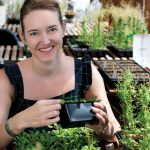How targeting killer T cells in the lungs could lead to immunity against respiratory viruses
Salk Professor Susan Kaech examined the immune cells in the lungs, a significant site of damage during the COVID-19 infection. When we are first exposed to bacteria or viruses, immune cells called killer T cells destroy the infected cells to prevent the spread of the disease. Killer T cells effectively provide long-term protective immunity against the invader, a fundamental concept behind vaccination. Kaech’s team, including first author and then-graduate student Jun Siong Low, found that the cells responsible for long-term immunity in the lungs can be activated more easily than previously thought. The insight could aid in the development of universal vaccines for influenza and the novel coronavirus.
Share:
[ssba]
Featured Stories
 Leading Salk science into the futureInside Salk sat down with Rusty Gage to learn more about his background, approach to managing a world-renowned Institute, and vision for Salk science over the next decade.
Leading Salk science into the futureInside Salk sat down with Rusty Gage to learn more about his background, approach to managing a world-renowned Institute, and vision for Salk science over the next decade. Julie Law – Revealing RNAAssociate Professor Julie Law shares common themes underlying her research and discusses what motivates her both in and out of the lab.
Julie Law – Revealing RNAAssociate Professor Julie Law shares common themes underlying her research and discusses what motivates her both in and out of the lab.
 Gerald Pao – Pushing the limits in science and lifeFrom studying the novel coronavirus to downloading brains to computers, Staff Scientist Gerald Pao is at the forefront of scientific advancement.
Gerald Pao – Pushing the limits in science and lifeFrom studying the novel coronavirus to downloading brains to computers, Staff Scientist Gerald Pao is at the forefront of scientific advancement. Austin ColeyAustin Coley, though only at Salk since 2019, has already taken an active role in everything from conducting innovative research on the brain to spearheading a wide variety of outreach activities.
Austin ColeyAustin Coley, though only at Salk since 2019, has already taken an active role in everything from conducting innovative research on the brain to spearheading a wide variety of outreach activities. Salk’s Harnessing Plants Initiative (HPI) Garners Widespread SupportNew grants are supporting the Institute’s efforts to optimize plants’ natural ability to store carbon and mitigate climate change. This support bolsters the ongoing HPI project focused on model plants that was funded through donations to The Audacious Project in 2019.
Salk’s Harnessing Plants Initiative (HPI) Garners Widespread SupportNew grants are supporting the Institute’s efforts to optimize plants’ natural ability to store carbon and mitigate climate change. This support bolsters the ongoing HPI project focused on model plants that was funded through donations to The Audacious Project in 2019.


















































